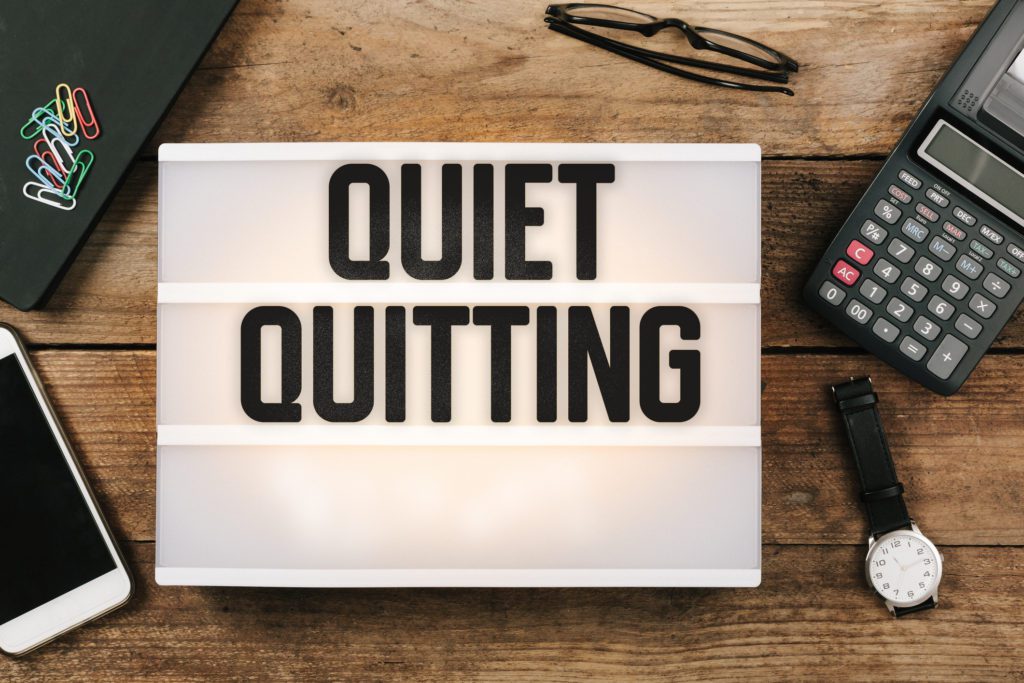If you haven’t heard of a guy named Zaid Khan, you’d better pay attention.
A few weeks ago, this Khan guy, posted a 17-second video on TikTok that is probably more consequential to American business than COVID, supply chain interruptions or inflation.
Kahn introduced millions and millions of people to the concept, if you can call it a concept and not a crock, of quiet quitting.
What is quiet quitting, you may ask? Well, buckle up and I’ll tell you.
Khan, this 20-something, self-appointed workplace expert says, “You’re not outright quitting your job, but you are quitting the idea of going above and beyond.” He says, “You’re still performing your duties, but you’re no longer subscribing to the hustle culture mentality that work has to be your life.”
Well, Mr. Khan, I know you probably know everything about creating a career, but here’s some perspective from a forty year career in corporate America. In every job I had, in every position I held, whether it was entry level or high level, I went above and beyond.
Needed me to fetch lunch? I did it. Needed me to work a double shift or work on holidays? I raised my hand.
I did it to advance in my beloved profession. And yes, I did it to make more money, to provide more for my family.
It was in my DNA to do more, to want more, to achieve more. Maybe, Mr. Khan, I was a putz, but I believed in my calling and I had a goal.
As financial guru Kevin O’Leary said in a video essay on CNBC, “Quiet quitting is a really bad idea…You have to go beyond not because you’re forced to, not because you have to but because you want to. That’s how you achieve success.”
I’ve come across many people in my career who loved having the job security of being in a union, knowing that if they showed up for work, did what they were assigned to do and then went home, they would never, could never be fired. They didn’t want to make decisions, they just wanted to do what they were assigned, collect their paychecks and count the years to retirement. Bless their hearts.
I never understood how that would be a meaningful way to live, but I came to accept it as a fact of life that I couldn’t change.
But now, in my retirement, there is something about quiet quitting that does resonate with me.
For your entire career, you strive to separate yourself from the pack of punchcard employees. You go above and beyond, you work your tail off, sometimes at the expense of your personal life. You are dedicated to your employer and to your colleagues and then…boom!
You’re chewed up and spit out.
The corporation says don’t let the door hit you in the ass on the way out.
The nine to fiver is still collecting a salary, doing just enough to stave off the pink slip. But the leader, the person who was asked to take on responsibilities and risks, the person who left it all on the field, is kicked to the curb.
So who has the last laugh?
Maybe the answer isn’t as simple as a choice between being a quiet quitter or being a high achiever.
Cultivating a culture of high achievement behooves bosses to support and protect those same employees.
If bosses want their employees not to be quiet quitters, then those high achieving employees can’t be walking on eggshells, believing that the smallest slip-up will get them disciplined, fired or crucified on social media.
If employers want to push back against the quiet quitters, they also need to create space for down time and disengagement for the above and beyonders. They must know when it’s OK to keep their foot on the gas and when it’s time to shift into neutral and coast. No one can continually speed at 100 miles per hour and still live a normal life.
So, if you want to be a quiet quitter, be my guest and have at it. But keep this in mind; once you’ve joined that club, you’ve removed yourself from the conversation of how to make your workplace more balanced and flexible.
You can’t do the minimum and then complain about the culture. You’ve made your choice, be happy and enjoy your lives in majestic mediocrity.


5 thoughts on “Quiet Quitting”
Provocative piece David. It brought back some interesting memories!
Amen, FWOB.
Exactly!!
Those who can work more, do, and often advance and have more.
Those who can’t, try to make due.
Those who won’t, have made their choices (or their beds) and have to live (or sleep) with their choices.
Isn’t this the basis of our successful capitalist economy ?
I enjoyed your article and totally agree with you. I had the same philosophy about work the years I worked before becoming a caregiver. Sadly my company didn’t appreciate my hard work which saddened me immensely. I often think of the saying a mentor told me years ago that companies exist not because of themselves but despite themselves. My husband shares your work ethic despite hardships in the world place and will feel this way until retirement. I don’t believe in quiet quitting.